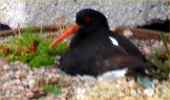 | Caithness.Org | Community | Business | Entertainment | Caithness... | Tourist Info | Site Map |
• Advertising • Chat Room • Contact Us • Kids Links • Links • Messageboard • News - Local & Scottish • News - UK & News Links • About / Contact Us • Submissions |
• Bookshop • Business Index & News • Jobs • Property For Sale • Property For Rent • Shop • Sutherland Business Index |
• Fishing • Fun Stuff • George, The Saga • Horses • Local Galas • Music • Pub Guide • Sport Index • What's On In Caithness |
• General Information • B & Bs • Backpackers • Caravan & Camping • Ferries • Getting Here • Holiday Letting • Hotels • Orkney • Pentland Firth • Sutherland • Taxis |
| N E W S F E E D S >>> |
Caithness News Bulletins July 2003
| July News Index | June News Index | ||
| Dounreay Visitor Centre | Dounreay News | Caithness Visitor Centres, Museums Etc | |
|
VISITORS FLOCK TO SEE NEW FAST BREEDER AT DOUNREAY
The nest has been a real talking point for almost 3000 people who've walked past the flower-tub to go through the doors of the visitor centre since it opened in the Spring. With the goodwill of visitors and vigilance of the tour guides, the nest was left undisturbed, letting two healthy chicks hatch. Tina Wrighton, who manages the visitor centre, said: "It's been a real surprise for our visitors when they realised they were walking past the nesting site of such a beautiful bird.
Norrie Russell, who manages the RSPB reserve at nearby Forsinard in Sutherland, said: "Oystercatchers seem to delight in selecting odd nest sites such as flat-roofed buildings. The hollowed-out tops of fence strainer posts are a big favourite in Caithness, but a flower tub in such a public place is certainly the strangest one I have come across. "Anything that looks vaguely like a pebbly beach, which their eggs are perfectly designed to mimic, is normally attractive to them. Of all the waders they are the bold and brash brigade, with their bright plumage and orange beak and they have expanded their range enormously in the UK by colonising inland farmland and riversides in the last 50 years. Mussels and other coastal foods are in rather short supply in such areas and these intelligent birds, which can live for well over 30 years in age, have adapted to new sources of invertebrates in the grasslands". |











